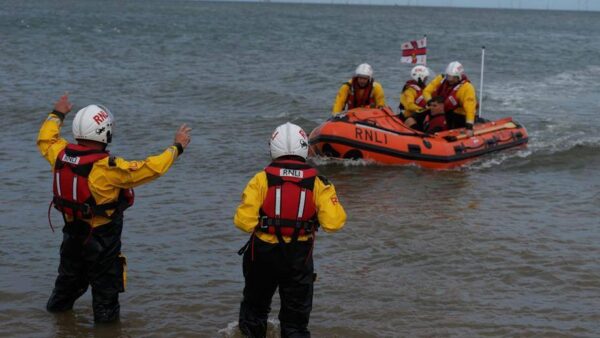Experience the Thrill of Saving Lives at Sea with Skegness RNLI
Skegness RNLI are looking for volunteers to help with the important work they do in helping to save lives.
Skegness RNLI, which is based on Tower Esplanade, Skegness have announced they are looking for volunteers to help save lives and keep the waters safe.
The lifeboat station, founded in 1825 which is staffed by a dedicated team of volunteers who are committed to saving lives at sea are looking for new members to join the team.
The Royal National Lifeboat Institution (RNLI) relies on the passion and dedication of volunteers to power its lifesaving service. From lifeboat crews to press officers, fundraisers to shop volunteers, there are countless ways you can contribute to the success of the service.
Volunteering as a lifeboat crew member at Skegness RNLI is not only an exciting and fulfilling role but also an opportunity to make a tangible difference in the local community.
Here are some compelling reasons to consider joining the team:
- Making a Difference
By becoming a volunteer at Skegness RNLI, you have the chance to save lives at sea and be an integral part of a larger RNLI family dedicated to preserving life. Imagine the wind in your hair, the salt in the air, and the knowledge that you’re making a difference where it matters most.
- Inclusivity and Diversity
The RNLI is an inclusive and diverse organization that welcomes individuals from all walks of life. It celebrates the unique skills and perspectives that each volunteer brings to the team. Regardless of your background or experience, there is a place for you at Skegness RNLI.
- First-class Training and Support
When you join Skegness RNLI, you’ll receive top-notch training, state-of-the-art equipment, and ongoing guidance and support. The charity ensures that all volunteers are well-prepared for their vital roles and invests in their development. Whether you’re new to the world of maritime rescue or have previous experience, you’ll be equipped with the skills and knowledge needed to save lives.
- Skills and Experience
Volunteering with the RNLI provides an opportunity to learn new skills and gain valuable experience that can enhance your CV and benefit your personal and professional growth. From boat handling and casualty care to navigation and radar operation, the skills you acquire as a lifeboat crew member are transferable and highly sought after in various industries.

Life as a Crew Member: Challenges and Responsibilities
While volunteering as a lifeboat crew member is undoubtedly rewarding, it also comes with unique challenges and responsibilities that require commitment and dedication. Here are some aspects to consider:
- Unpredictable Lifestyle
Life on the crew is far from predictable. Emergencies at sea do not adhere to schedules, and as a crew member, you can be called away from your family, your bed, and your work at any time. This role demands flexibility and readiness to respond to emergencies promptly.
- Training Commitment
As a crew member, you’ll spend many hours training to ensure you’re prepared for any situation. This commitment ensures that you can respond effectively to emergencies at sea. Training sessions cover various aspects of rescue operations, including boat handling, radio communications, casualty care, navigation, and radar.
- Reimbursement
While the role is voluntary, Skegness RNLI recognizes the financial commitment that crew members make. As a crew member, you will be entitled to reimbursement for any expenses incurred in your capacity as a volunteer.
- Impact on Family and Work
Volunteering as a lifeboat crew member can be incredibly rewarding, but it’s essential to acknowledge that it may also impact your family and work life. Open communication and understanding among crew members are crucial to managing the demands of the role effectively.
Volunteer Roles at Skegness RNLI
Skegness RNLI offers various volunteer roles to suit different interests and skills. Here are some of the key roles available:
- Lifeboat Boat Crew
Volunteer lifeboat crew members, in collaboration with the coxswain or helm, operate the lifeboat during rescues and ensure the safety of those in need. Alongside attending rescues, crew members commit to regular training in boat handling, radio communications, casualty care, navigation, and radar. Lifeboat crew members typically start as Shore Crew and progress to seagoing roles within six to twelve months.
- Shore Crew
Shore crew members play a vital role in assisting with the launch and recovery of lifeboats during service and exercises. They also contribute to the overall upkeep of the station, lifeboats, and equipment. This behind-the-scenes role is essential to the smooth operation of the lifeboat station.
- Deputy Launch Authority
Deputy Launch Authorities play a crucial role in ensuring that all operational activities maintain the lifeboats and associated equipment in a constant state of readiness. They are responsible for authorizing the use of the lifeboats on a duty basis and participate in the authorization of service launches and exercises.
If you’re ready to embark on a meaningful and rewarding journey as a Skegness RNLI volunteer, we invite you to register your interest by filling out the online form. Your commitment can help save lives at sea and make a positive impact on your local community.
To learn more about volunteering opportunities at Skegness RNLI, you can reach out to: Paul Simpson, Lifeboat Operations Manager at: paul_simpson@rnli.org.uk


